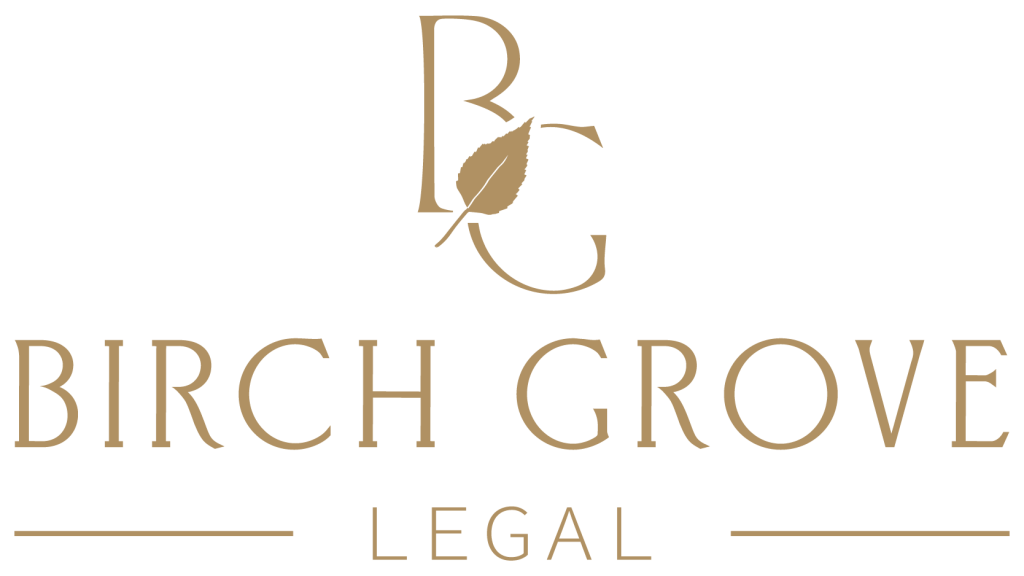Probate In Colorado: Complete Guide [Probate 101]
Losing someone you love is never easy. Colorado’s probate process makes things only worse.
If your loved one left behind property or assets, probate is often necessary to ensure they are legally transferred to the rightful heirs.
Birch Grove Legal specializes in estate and probate law, helping families like yours through this challenging time.
In this article, we’ll break down probate in Colorado step by step, and help you understand your rights and responsibilities so you can handle the process with confidence and clarity.

What Is Probate in Colorado?
Probate (also known as estate administration) is the legal process for distributing the assets of a decedent (a loved one who has passed away) under court supervision. This process ensures that all assets are accounted for, debts are paid, and the remaining property is distributed to the rightful heir.
Under Colorado law, probate is necessary if the decedent owned real estate or personal assets valued at more than $82,000. However, some assets, like those in a trust or with named beneficiaries, can bypass the probate process.
Understanding the Colorado Probate Process
There are seven important steps in the Colorado Probate process:
- File a petition—Probate begins when a family member or named executor files a petition with the court to open the estate and appoint a personal representative.
- Appoint a personal representative—The court appoints a personal representative (Colorado’s term for an executor) to manage the estate. The personal representative has one of the most important roles in overseeing the probate process.
- Notify heirs, beneficiaries, and creditors—The representative informs all parties of their appointment and publishes a notice to creditors, giving them a chance to file claims against the estate.
- Determine assets and their value—The personal representative identifies and appraises the estate’s assets to determine their total value.
- Settle debts and taxes—Using the estate funds, the representative pays any outstanding debts, taxes, and financial obligations.
- Distribute remaining assets—Once debts are resolved, the representative distributes the remaining property to the heirs or beneficiaries according to the decedent’s will or Colorado inheritance laws.
- Close the estate—After distribution, the personal representative files a final accounting with the court. Once approved, the estate is closed and probate ends.
Types of Probate in Colorado
There are three types of probate you should know about:
- Informal probate—If the decedent has a clear, valid will with no major contestation among heirs, then an informal probate process is allowed under a court-appointed personal representative. The representative distributes assets with minimal intervention from the court. But the court ensures due procedure is followed and holds the representative accountable if they fail to follow court rules.
- Formal probate—If the decedent’s will is unclear, contested, or invalid, or if there are any significant challenges in its administration (such as difficulty in identifying heirs or dispute over property title), then formal probate is required. The court will hire a personal representative to distribute the decedent’s assets and may require them to get approval for each transaction. Formal probates must be open with the court for at least six months.
- Small estates and affidavit collection—This applies if the decedent has no real property and has $50,000 or less in personal property (cash and bank accounts). In this case, the devisees or heirs can collect these assets using an affidavit, without having to open a probate in court. They must swear entitlement in court and must agree to fairly distribute assets to any other entitled heirs.
How Long Does Probate Take In Colorado?

A typical probate process can take anywhere from 9 to 24 months. However, remember that each case is unique, and many factors can influence the duration. These factors include:
- The size and complexity of the estate—Larger estates typically take longer to go through probate.
- Court rules—The court may require certain waiting periods, which can extend the process further.
- Creditor claims—The probate must remain open long enough for creditors to file claims. If there are any disputes with creditor claims, this may prolong the process.
- Real estate sales—If the estate includes property to be sold, this can cause significant delays.
Informal probate typically moves faster than formal probate, since the court approves matters without requiring hearings.
At the minimum, however, a probate will take at least 6 months because Colorado law requires both informal and formal probates to remain open in court for this duration.
What Happens if There’s No Will in Colorado?
If a person dies without a will (or dies “intestate”), Colorado’s intestacy laws determine how their probate assets will pass upon death.
Probate assets are usually passed first to the decedent’s surviving spouse and children. If the decedent has a blended family, the law specifies terms to divide assets between the surviving spouse or the decedent’s children from the current/former partner.
If the decedent does not have children or a surviving spouse, the probate assets pass first to their parents (if living), and then to siblings and other relatives.
Key Documents in the Colorado Probate Process

Here are the most important documents in the Colorado probate process:
- The Last Will and Testament of the deceased
- A copy of the deceased’s death certificate
- Petition for probate
- Letters of testamentary (a court-given document granting the personal representative authority to act on behalf of the estate)
- The Personal Representative deed
- A list of heirs
- A complete inventory of the estate/assets
What Is a Nominee in a Colorado Probate Case?
A nominee in a probate case is the individual a decedent has nominated in their will as their personal representative.
Under Colorado law, a nominee is given priority when appointing a personal representative for the decedent’s estate. However, the court is not required to appoint the decedent’s nominee and may choose another personal representative if it sees fit.
Before being appointed, the nominee can take certain actions on behalf of the estate. Examples include arranging the burial, preserving the decedent’s assets, or requesting the search for an original will. But they do not have the full authority to act as a representative unless they are formally appointed by the court.
Special Considerations for Colorado Probate
While we’ve covered most general probate laws above, here are three state-specific probate laws that are important for Colorado residents to know:
- Colorado has mandatory will filing, meaning that even if no formal probate is necessary, the decedent’s will must be filed with the District Court within ten days of their passing.
- Colorado law mandates that personal representatives notify creditors about the probate either by mail or through publication, giving them a window to make claims against the estate before any distributions are made.
- In case the estate does not have enough assets to pay off the decedent’s debt, Colorado law dictates an order of priority for debt payment. The legal costs of administration come first, followed by secured debts, then unsecured debts, and then any leftover state and federal taxes.
Avoiding Common Probate Pitfalls in Colorado
Probate in Colorado can get tricky. But if you avoid these common mistakes, you’ll make the process a lot smoother for yourself and all involved parties. These guidelines are especially important if you’ve been appointed personal representative for the decedent.
1. Familiarize Yourself With the Will
Ensure you locate and read the will in its entirety. Never assume that you know what the will says or that you remember it from a previous reading.
Many times, what people think the will says is often very different from what they end up encountering in probate court.
2. Understand Colorado Probate Law
Probate law is complex. But it’s important to build at least a layman’s understanding of the rules in the Colorado Probate Code and, if applicable, the Colorado Trust Code.
This will help you keep up with the proceedings and ensure the process is as smooth and hassle-free as possible.
3. Be Transparent With Beneficiaries and Creditors
Ensure open and clear communication with all parties involved in the estate, including beneficiaries and creditors.
While this is legally required, it is also important to prevent misunderstandings and reduce the risk of disputes that may slow down the probate process.
Also, avoid making promises to beneficiaries or creditors about when or how they will receive their portion of the estate.
Probate can take longer than expected, and you may encounter unanticipated issues like unpaid debts or taxes. Any promises you make may backfire if the circumstances change.
4. Do Not Redistribute Assets Prematurely
The worst mistake you can make in a probate is distributing the decedent’s assets before all debts, taxes, and expenses are paid.
Wait for the due process to avoid incurring personal liability if creditors and beneficiaries do not end up getting their rightful share.
5. Lawyer Up
Probate law is complex and encompasses many legal areas, including tax, real estate, and contract law.
No matter how much you read up as a layman, you always run the risk of making costly mistakes and delays.
We highly recommend hiring an experienced probate attorney to help you go through the process with ease.
Talk to Experts for a Smooth Probate in Colorado
The probate process in Colorado can be confusing, but you don’t have to face it alone. Birch Grove Legal is here to guide you every step of the way.
With our expertise in estate and probate law, we provide personalized support to ensure your loved one’s assets are handled with care and efficiency.
Whether you’re dealing with formal or informal probate, understanding intestacy laws, or resolving creditor claims, our attorneys offer the clarity and confidence you need during this challenging time.
Schedule a consultation today to protect your family’s legacy and simplify the probate process.
Frequently Asked Questions About Colorado Probate Laws
Does a Will Have to Be Probated in Colorado?
Yes, all wills and intestate estates must go through probate in Colorado. However, the degree of court involvement and the complexity of the process varies from case to case.
What Happens if No Probate Is Filed?
If no probate is filed for a will, the decedent’s assets cannot be legally transferred, meaning rightful heirs cannot inherit any property, real estate, or financial accounts.
Additionally, if you are the will’s executor and you do not file a probate, the creditors/heirs of the estate have grounds to file a lawsuit against you.
Can You Avoid Probate in Colorado?
Yes, it is possible to avoid probate in Colorado if a person creates a living trust, names beneficiaries on their financial accounts, or owns property jointly with someone else. These situations allow assets to bypass the probate process.
How Do I File Probate Forms in Colorado Courts?
To initiate a probate action in Colorado, you must complete the necessary probate forms and file them with the appropriate county court. Forms vary depending on whether the case is formal, informal, or for a small estate. Resources for these forms are often available through the Colorado Judicial Branch website.
How Do I Start a Probate Action in Colorado County Courts?
A probate action begins by filing a petition with the county court in the decedent’s place of residence. You will need supporting documents like the will, death certificate, and completed probate forms. The court will then determine the appropriate steps for handling the estate, including appointing a personal representative and overseeing asset distribution.
What Resources are Available for Estate Planning and Probate in Colorado?
Various resources can assist with probate and estate planning in Colorado:
- Colorado Judicial Branch Website: Offers probate forms and guides.
- Legal Aid Clinics: Provide free or low-cost guidance for simple probate matters.
- Colorado Bar Association: Offers tools, referrals, and information for residents needing legal support.
- Probate Attorneys: Professionals like the attorneys at Birch Grove Legal can help with estate administration and probate law.
These resources can help simplify the process and ensure compliance with Colorado probate laws.
What is the Difference Between a Probate Action and a Lawsuit in Colorado?
A probate action is a legal process to settle a deceased person’s estate under court supervision. This includes distributing assets, paying debts, and ensuring the decedent’s wishes (or intestate laws) are followed.
A lawsuit, on the other hand, occurs when disputes arise during probate. Common disputes include:
- Will contests: Challenges to the validity of the will.
- Claims against the personal representative: Allegations of mismanagement or misconduct.
- Beneficiary disputes: Conflicts over asset distribution.
These issues may require formal probate and additional court hearings to resolve.
What Information is Required to Begin Estate Planning in Colorado?
To begin estate planning in Colorado, individuals should gather the following information:
- Assets: A detailed list of all property, financial accounts, and real estate.
- Debts: Documentation of outstanding loans, taxes, and financial obligations.
- Beneficiaries: Names and contact information of individuals or organizations to inherit assets.
- Estate Planning Documents:
- Last Will and Testament
- Living Trusts
- Power of Attorney
- Healthcare Directives
Proper preparation of these details can ensure a smoother estate planning process and help avoid complex probate issues.
How Do I Fill Out Colorado Probate Forms?
Colorado probate forms must be completed accurately and filed in the appropriate county court. Here’s what you’ll need to include:
- Details of the Decedent: Full name, date of death, and place of residence.
- Personal Representative Information: Contact details and the nominee’s qualifications.
- Estate Assets: A complete inventory of real estate, bank accounts, vehicles, and other assets.
- Liabilities: List of outstanding debts, taxes, and financial claims.
[trustindex no-registration=google]






0 Comments